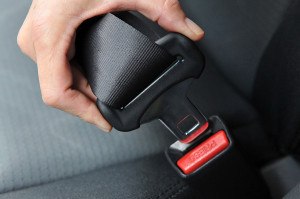Virginia will continue to have one of the weakest seatbelt laws in the country after a Senate committee killed a bill to require rear-seat passengers in a motor vehicle to wear safety belts and to make violating the state’s seatbelt law a primary offense.
The Senate Transportation Committee voted 6-5 Wednesday to shelve SB 1282, which sought to expand Virginia’s seat-belt requirements. Currently, only the driver and front-seat passengers must wear a safety belt (or children must be secured in car seats). Violations are a secondary offense, meaning officers cannot pull drivers over and ticket them simply for not wearing a seatbelt.
Sen. George Barker, D-Fairfax, who introduced the bill, urged the committee to approve it.
“After years of decline in traffic fatalities, we are now seeing an increase number of traffic fatalities – to some extent related to distracted driving issues,” Barker said. “This bill is something that can help address that and something we need to do to help ensure the safety of those riding a vehicle in Virginia.”
Since 2014, Virginia has seen a 20 percent increase in traffic-related fatalities and a 20 percent increase in fatalities related to unrestrained passengers and drivers, according to the Virginia Department of Motor Vehicles. In 2017, the latest year for which data are available, 308 unrestrained drivers and passengers died in crashes.
Traffic safety groups supported Barker’s bill calling for primary enforcement to seat-belt usage for both front and rear passengers.
The National Highway Traffic Safety Administration has found that states with primary seat-belt enforcement laws “consistently have higher observed daytime belt use rates and lower fatality rates than secondary law states.” Virginia is among 16 states where seatbelt violations are a secondary offense. If someone is ticketed for the offense in Virginia, the fine is $25.
The Senate Transportation Committee split along party lines over the bill. The six Republicans on the panel voted to kill SB 1282; the five Democratic committee members voted to keep the bill alive.
After the vote, Georjeane Blumling, vice president of public affairs for AAA Tidewater Virginia, said she was disappointed but not surprised that the committee killed the bill.
“We knew that moving to a primary enforcement law was going to be a challenge,” Blumling said. “It has been (a challenge finding) balance between personal liberty and public safety for many years, and we appreciate Sen. Barker putting forth a bill to try to increase that safety by making seatbelts both in the front and back required and a primary offense.”
(This story was produced by the Virginia Commonwealth University’s Capital News Service.)
Was this article valuable?
Here are more articles you may enjoy.

 UBS Top Executives to Appear at Senate Hearing on Credit Suisse Nazi Accounts
UBS Top Executives to Appear at Senate Hearing on Credit Suisse Nazi Accounts  Navigators Can’t Parse ‘Additional Insured’ Policy Wording in Georgia Explosion Case
Navigators Can’t Parse ‘Additional Insured’ Policy Wording in Georgia Explosion Case  Credit Suisse Nazi Probe Reveals Fresh SS Ties, Senator Says
Credit Suisse Nazi Probe Reveals Fresh SS Ties, Senator Says  LA County Told to Pause $4B in Abuse Payouts as DA Probes Fraud Claims
LA County Told to Pause $4B in Abuse Payouts as DA Probes Fraud Claims 